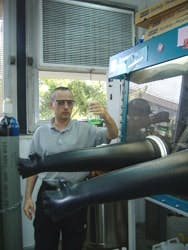Aldehyde Reaction Goes Green
Water can play a wider role in organic synthesis even though many organic compounds have low aqueous solubility, believe researchers at Tel Aviv University, Tel Aviv, Israel. The key is to have reactions occur on instead of in water, explain Arkadi Vigalok and Nelly Shapiro of the school of chemistry. Replacing the organic solvents now used for such syntheses with water would eliminate a source of pollution, they add.The researchers found that aldehyde oxidation by air occurs easily and at high yields on water at ambient pressure and 40°C. Water-insoluble aliphatic (branched and linear) and aromatic aldehydes float on top of the water. Stirring creates aqueous suspensions in which the aldehydes react (on water) with air to form the corresponding carboxylic acids. In small-scale laboratory trials, yield percentages reached the upper 80s for some compounds. “We can get higher yields if we use higher temperatures, O2 instead of air, and wait longer times. We can get well over 90%,” says Vigalok (Figure 1).

